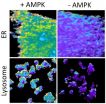(Press-News.org) Bacteria that naturally reside in the gut are important for health, but recent studies consistently show that a modern lifestyle depletes the gut's collection of microbes. How lifestyle affects the diversity of this gut "microbiome" is unclear, but an analysis of the gut microbiomes of Papua New Guinean and US residents in Cell Reports now suggests that western lifestyle may diminish the variety of bacteria in the gastrointestinal tract by limiting their ability to be transmitted among humans.
"There are several aspects of western lifestyle that have been hypothesized to alter the gut microbiome and decrease diversity," explains senior author Jens Walter of the University of Alberta Department of Agricultural, Food & Nutritional Science. "These include diet, sanitation, and clinical practices such as antibiotic use and caesarean sections, but we lack a conceptual understanding of how our microbiomes are altered."
Walter and his colleagues compared the fecal bacteria of adults from two rural, non-industrialized regions in Papua New Guinea with those of US residents. Papua New Guinea remains one of the least urbanized countries in the world, and the individuals who were studied live a traditional, subsistence agriculture-based lifestyle.
The research team found that Papua New Guineans have microbiomes with greater bacterial diversity, lower inter-individual variation, and vastly different compositional profiles compared with US residents. US residents lacked approximately 50 bacterial types that belonged to the core microbiome in Papua New Guineans. Their analysis found that the relative importance of ecological processes that structure the gut microbiota differ in westernized and non-industrialized societies. Specifically, bacterial dispersal, or the ability of bacteria to move from individual to individual, appears to be the dominant process that shapes the collection of gut bacteria in residents of Papua New Guinea but not those in US residents.
"These findings suggest that lifestyle practices that reduce bacterial dispersal--specifically sanitation and drinking water treatment--might be an important cause of microbiome alterations," Walter says. "We propose a model based on ecological theory that fits the data and provides an explanation for the decline of microbiota diversity in urban-industrialized societies."
The information obtained in this study has implications for human health, given that microbiome alterations associated with westernization might contribute to increases in noncommunicable chronic diseases occurring in industrialized countries. The investigators noted the importance of caution when questioning specific modern lifestyle practices, though, because overall, health and life expectancy is higher in westernized societies.
"However, we can think about how we can reduce the collateral damage of modern lifestyle practices on the gut microbiome without jeopardizing the benefits," says co-author Andrew Greenhill, a senior lecturer in microbiology at Federation University Australia. "The findings from this study provide information that could be used to develop strategies to prevent and redress the impact of westernization and potentially support the dispersal and transmission of microbes that have been eradicated."
Additional research is needed to determine the specific lifestyle and cultural factors that impose microbiome differences, their relative importance, and the underlying mechanisms by which microbiomes are altered. In addition, the impact of bacterial types absent from western populations on human health should be studied. "Such research might provide important information on the causes of western lifestyle diseases and a basis for the development of therapies for their treatment and/or prevention," Walter says.
INFORMATION:
Cell Reports, Martinez et al.: "The gut microbiota of rural Papua New Guineans: Composition, diversity patterns, and ecological processes" 10.1016/j.celrep.2015.03.049
Cell Reports, published by Cell Press, is a weekly open-access journal that publishes high-quality papers across the entire life sciences spectrum. The journal features reports, articles, and resources that provide new biological insights, are thought-provoking, and/or are examples of cutting-edge research. For more information, please visit http://www.cell.com/cell-reports. To receive media alerts for Cell Reports or other Cell Press journals, contact press@cell.com.
Oral infections are the most common diseases of mankind and are also a key risk factor for heart disease, which is the leading cause of death worldwide. In a review article published in Trends in Endocrinology and Metabolism on April 16, researchers summarize the latest clinical evidence supporting a link between oral infections, which are caused by the bacteria in our mouth, and heart disease, and they emphasize the important role of inflammation in both of these conditions.
"Given the high prevalence of oral infections, any risk they contribute to future cardiovascular ...
By analyzing the activity of "GPS" neurons in mice, researchers at the Stanford University School of Medicine have discovered that the mental maps created by these cells accumulate errors, which are corrected when the animal encounters a wall.
The findings support the theory that these cells, called grid cells, use an animal's perceived speed and direction to help it navigate familiar places.
Thus, as you stumble through your pitch-black kitchen in the middle of the night for a glass of water, your body knows how many steps to take and when to turn to get to the sink. ...
Men give more money through fundraising websites after seeing that other men have donated large amounts and when the fundraiser is an attractive woman, according to new UCL and University of Bristol research.
The scientists say this response by men is unlikely to be conscious and could have an evolutionary function as theories predict that generous actions can honestly signal hidden qualities, such as wealth or desirable personality attributes, to potential partners.
Co-author Dr Nichola Raihani from UCL (Life Sciences), said: "We looked at why people behave generously ...
A nerve neglected in today's era of molecular and genetic analysis has yielded a surprising secret. A handful of neurons control breathing in a fine-tuned but powerful way, scientists have discovered in mice. Among these sensory neurons, two types are dedicated to two specific respiratory functions.
The findings, published in Cell, suggest new ways of considering clinical conditions related to the vagus nerve.
The team, led by Stephen Liberles, Harvard Medical School associate professor of cell biology, has effectively deconstructed the vagus nerve, a key connection ...
The enzyme AMPK initiates a dizzying array of cellular activities, from breaking down worn-out cellular parts to turning on energy production. How does a single protein, activated by a single switch, fulfill so many different tasks without getting them mixed up? To get at such a complex question, cell biologists at Johns Hopkins designed several molecular tools that allowed them to watch, measure and manipulate the activity of the enzyme AMPK in individual compartments within the cell. The new tools have confirmed that at least some of AMPK's ability to multitask comes ...
Angiogenesis inhibitors--a widely used class of cancer drugs designed to shrink tumors by preventing them from forming new blood vessels--often work in the short term, but usually become ineffective within months. Now, a team led by UC San Francisco scientists has discovered a possible reason, one that could lead to a way to address the problem and prevent cancer relapse.
Working with laboratory models of pancreatic and breast cancer, the scientists found that myeloid cells, which originate in bone marrow and are part of the body's first-line of defense--the so-called ...
How does climate change affect the occurrence and distribution of species? This is a key question in the climate debate, and one that is hard to answer without information about natural variation in species abundance. Now researchers from Uppsala University can, for the first time, give us a detailed picture of natural variation through a major study published today in the leading scientific journal Current Biology.
The impact of climate change on species occurrence and distribution is a central issue in the climate debate, since human influence on the climate risks posing ...
The nutrients excreted by fish in their "pee" may be critical to the health of coastal ecosystems. But knowing whether generalizations can be made about how to predict these nutrient levels in various ecosystems has vexed researchers - until now.
In a paper published in Proceedings of the National Academy of Sciences, North Carolina State University associate professor Craig Layman and colleagues show that ecologists can better predict the rates of how these chemical nutrients are transferred by fish if they know the various fish species living in an ecosystem, along ...
An international team of scientists, led by researchers at University of California, San Diego School of Medicine, have found genetic overlap between Alzheimer's disease (AD) and two significant cardiovascular disease risk factors: high levels of inflammatory C-reactive protein (CRP) and plasma lipids or fats. The findings, based upon genome-wide association studies involving hundreds of thousands of individuals, suggest the two cardiovascular phenotypes play a role in AD risk - and perhaps offer a new avenue for potentially delaying disease progression.
The findings ...
A potentially game-changing breakthrough in artificial photosynthesis has been achieved with the development of a system that can capture carbon dioxide emissions before they are vented into the atmosphere and then, powered by solar energy, convert that carbon dioxide into valuable chemical products, including biodegradable plastics, pharmaceutical drugs and even liquid fuels.
Scientists with the U.S. Department of Energy (DOE)'s Lawrence Berkeley National Laboratory (Berkeley Lab) and the University of California (UC) Berkeley have created a hybrid system of semiconducting ...



